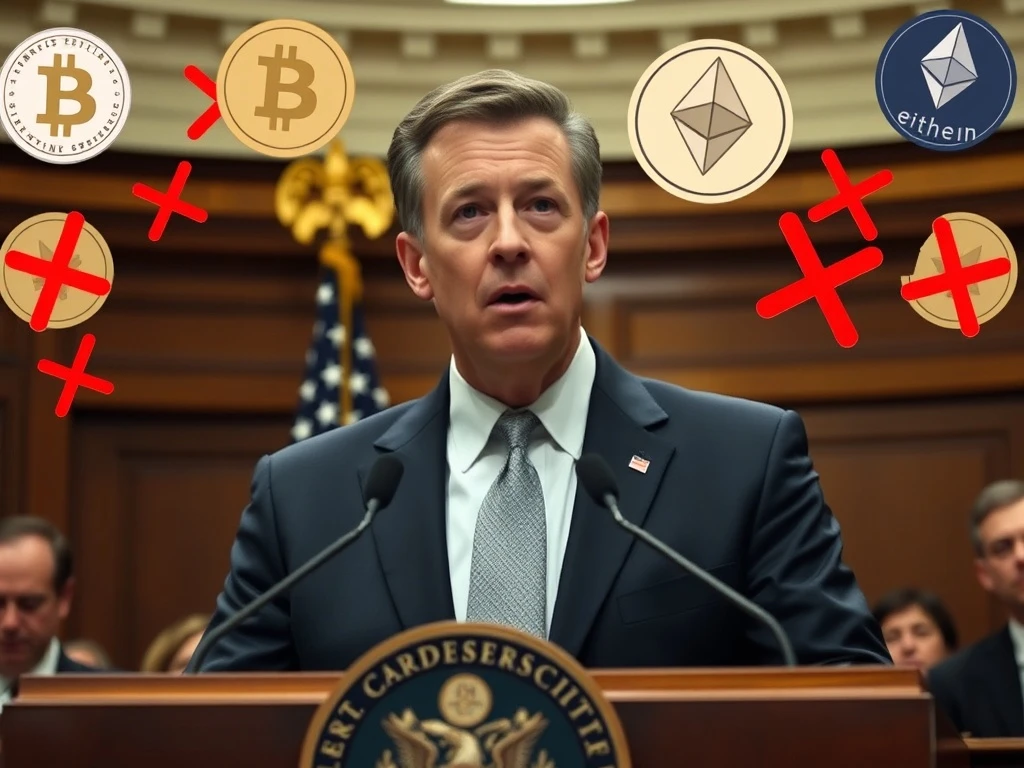Crypto Regulation: US Lawmakers Unleash Damning Scrutiny on Digital Assets

The world of digital assets is no stranger to controversy, but a recent declaration from a prominent US Lawmaker has sent ripples through the crypto community. When Representative Stephen Lynch asserted, ‘There is no legitimate use case for crypto,’ unless you count illegal activities, it ignited a fiery debate that cuts to the very heart of crypto regulation and the future of finance.
Why Are US Lawmakers So Divided on Digital Assets?
The recent press conference by Democratic lawmakers painted a stark picture of the current sentiment towards cryptocurrencies within certain political circles. Representative Lynch’s unequivocal condemnation, labeling the entire industry a ‘scam,’ underscores a deep-seated skepticism. He pointed to ransomware attacks, fueled by digital currencies, as prime examples of their illicit utility, arguing that crypto is a ‘highly risky and volatile product that has no business in a functioning and well-regulated financial system.’ This perspective is not isolated; Representative Maxine Waters, for instance, vocally opposed the CBDC Anti-Surveillance State Act, paradoxically calling it an ‘anti-innovation act’ and claiming it, alongside the GENIUS stablecoin bill, ‘endanger our national security.’ This stark division among US lawmakers highlights the complex and often contradictory views on how to approach this rapidly evolving sector.
Is There a Legitimate Use Case for Cryptocurrency Scams?
The core of Representative Lynch’s critique revolves around the perception of cryptocurrencies primarily facilitating illicit activities, particularly cryptocurrency scams and ransomware. His statement, ‘unless you count the illegal practices of every single ransomware heist that has affected US businesses, which have been fueled and facilitated by cryptocurrency,’ directly challenges the industry’s narrative of innovation and financial inclusion. While it is undeniable that bad actors exploit crypto’s pseudonymous nature for illegal gains, the industry argues that the vast majority of transactions are legitimate and that blockchain’s transparency can even aid law enforcement. This ongoing debate about the prevalence and impact of illicit crypto use is a significant hurdle for broader adoption and favorable crypto regulation.
The Global CBDC Debate: A Tug-of-War for the Digital Dollar?
While some US lawmakers decry private cryptocurrencies, they simultaneously champion the development of a Central Bank Digital Currency (CBDC). This push for a government-controlled digital dollar is seen by its proponents as a necessary step to maintain sovereign control over currency in the digital age and counter the perceived risks of decentralized assets. However, the path to a US CBDC is fraught with challenges and divided opinions. Former President Donald Trump signed an executive order banning CBDCs in January, and Federal Reserve Chair Jerome Powell stated the central bank would not develop one under his tenure.
Globally, the CBDC debate presents a mixed landscape:
- India: The Reserve Bank of India is expanding its CBDC test trials, exploring novel use cases for its digital rupee.
- Australia: Its central bank plans to test wholesale CBDCs in a closed experiment with select institutions.
- United Kingdom: Bank of England Governor Andrew Bailey has expressed caution, arguing against issuing a CBDC due to potential destabilization of the banking system, preferring to focus on tokenizing deposits instead.
The public sentiment in the US also leans against or is undecided on CBDC adoption, indicating that the journey toward a government-issued digital currency is far from settled.
Navigating the Future of Crypto Regulation
The statements from Capitol Hill underscore the urgent need for clear and comprehensive crypto regulation. The current legislative environment is fragmented, leading to uncertainty for businesses and investors alike. The ongoing efforts to revive various crypto bills in the US House, such as those mentioned in the ‘Editor’s Choice’ section, signify a slow but persistent movement towards establishing a legal framework. Achieving a balanced approach that fosters innovation while mitigating risks like cryptocurrency scams and market volatility is paramount. The challenge lies in reconciling the diverse views of US lawmakers and international precedents to create a regulatory landscape that can support a legitimate and secure digital financial system, whether it involves private digital assets or a government-backed digital dollar.
Conclusion: A Critical Juncture for Digital Assets
The strong words from US Representative Stephen Lynch and his Democratic colleagues serve as a powerful reminder of the deep skepticism that still permeates parts of the political establishment regarding cryptocurrencies. While the push for a digital dollar continues, the broader CBDC debate highlights a global divergence in approaches to digital currencies. The future of crypto regulation in the US hinges on the ability of US lawmakers to bridge their ideological divides and address concerns about cryptocurrency scams and market stability. For the crypto industry, this moment demands not just resilience, but a proactive engagement with policymakers to demonstrate the legitimate and transformative potential of blockchain technology beyond the headlines of illicit activity.







